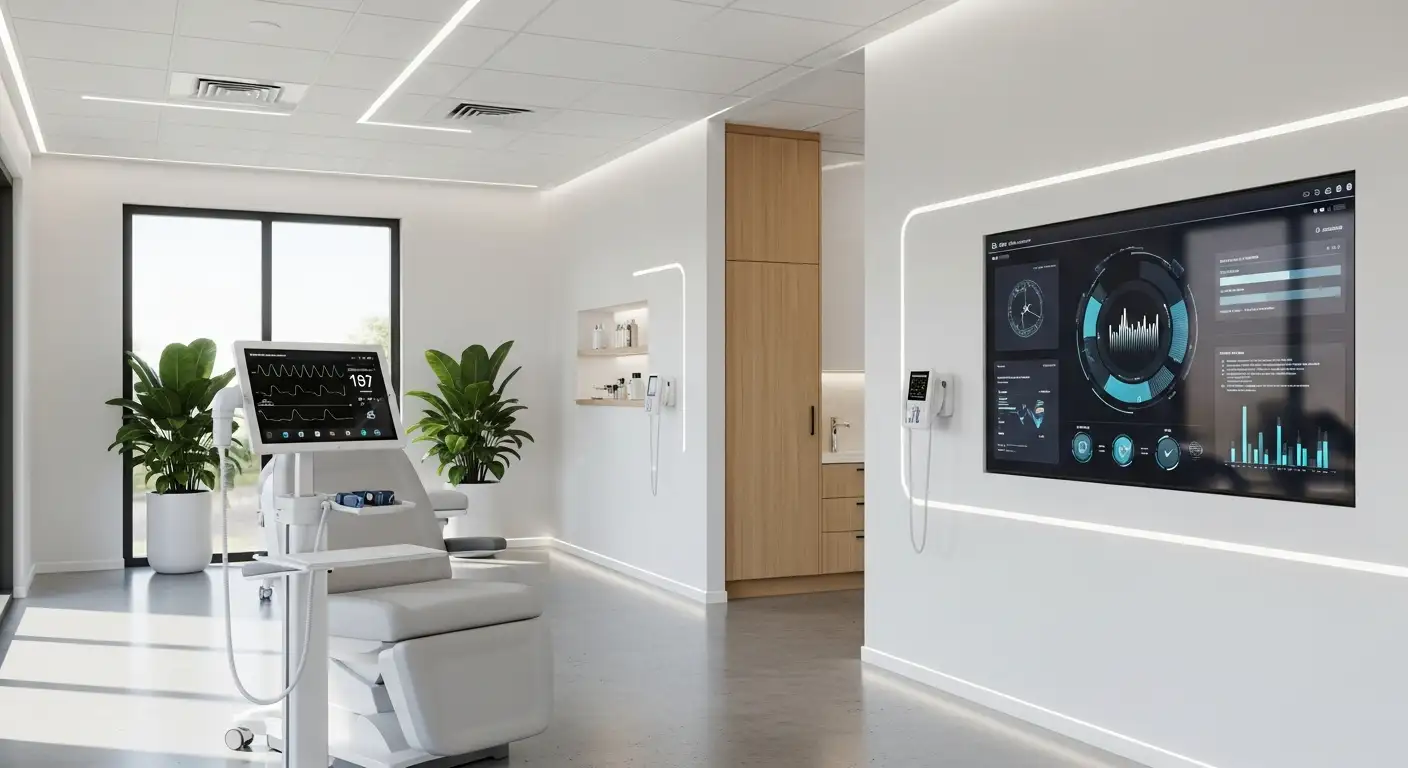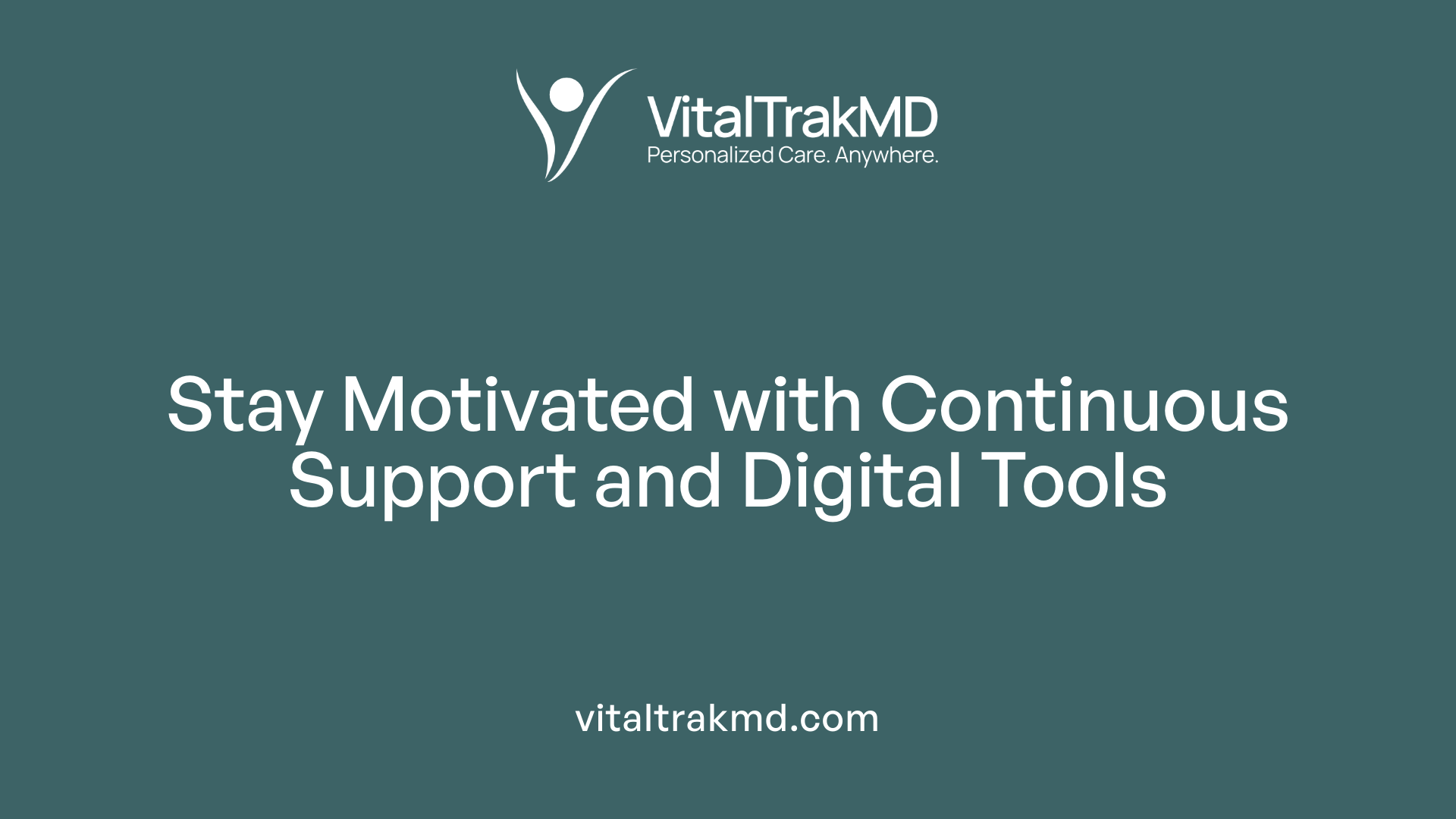The Role of Hybrid Care in Encouraging Regular Health Check-Ins at Home

A New Era in Health Management Through Hybrid Care
The integration of hybrid care models, combining virtual and in-person healthcare, is radically changing the way individuals manage their health at home, particularly in weight management and chronic disease care. This article explores how hybrid care encourages regular health check-ins, enhances patient engagement, and improves outcomes through innovative technologies and personalized support.
Understanding Hybrid Care: Flexibility Meets Personalization

What is Hybrid Care?
Hybrid care is a healthcare model that combines in-person visits with virtual care services. This approach provides the flexibility to tailor care delivery to the individual needs of patients by integrating face-to-face consultations with telehealth options such as video calls, remote monitoring, and virtual follow-ups.
How Does Hybrid Care Improve Patient Access and Convenience?
This model significantly enhances patient access and convenience by reducing waiting times and easing scheduling challenges. Patients who might struggle with transportation issues or require frequent check-ins benefit greatly from the option to receive care remotely. In turn, healthcare providers can monitor health conditions continuously and intervene promptly if needed.
Benefits of Hybrid Care
- Increased Flexibility: Patients can choose between visiting a healthcare facility or attending virtual appointments based on their preferences and needs.
- Improved Access: Removes barriers related to travel and time, making care more accessible to a diverse patient population.
- Reduction in Waiting Times: Virtual visits and remote monitoring ease the demand on physical clinic space and appointment slots.
- Suitability for Transportation Challenges: Patients living in remote or underserved areas or those with mobility limitations can maintain regular care without extensive travel.
Overall, hybrid care blends the personalized touch of in-person visits with the convenience and continuity of virtual healthcare, promoting better health outcomes and patient satisfaction.
Remote Patient Monitoring: The Backbone of Virtual Weight Management

What is Remote Patient Monitoring (RPM)?
Remote Patient Monitoring is a vital component of virtual care management that focuses on the continuous collection of health data from patients outside traditional clinical settings. In weight management programs, RPM tracks critical metrics such as weight, physical activity, and other health indicators to provide an ongoing picture of a patient's progress.
How does Continuous Tracking Work?
RPM utilizes advanced technologies like cellular-enabled scales and wearable devices to automatically record weight and activity levels. This seamless data capture enables patients to monitor their health conveniently at home while keeping healthcare providers informed in near real-time.
What Technologies Enable Effective Remote Patient Monitoring for Weight Management?
RPM relies on a suite of connected tools:
- Cellular-enabled scales: Devices that transmit weight measurements instantly to care teams.
- Wearable fitness trackers: Devices that monitor physical activity, heart rate, and other vital signs.
- Connected health apps: Platforms that consolidate data and facilitate communication between patients and providers.
These technologies ensure that data is transmitted continuously and securely, forming a robust foundation for proactive care.
Advantages of Near Real-Time Data Collection
The ability to collect data almost immediately after measurement means healthcare providers can observe trends as they emerge. This agility permits quick identification of concerning patterns, such as sudden weight gain or decreased activity, enabling prompt interventions tailored to the individual.
How Do Providers Use Data for Prompt Interventions?
Timely information flow supports personalized care adjustments and motivational feedback. Providers can reach out to patients quickly, recommend modifications to diet or exercise plans, or address emerging health issues before they escalate. This responsive model improves adherence and outcomes within weight management programs.
Proven Outcomes: How RPM Drives Weight Loss and Sustained Health Improvements

What evidence supports the effectiveness of RPM in weight loss?
Multiple studies conducted from 2016 through 2020 have firmly established Remote Patient Monitoring (RPM) as an effective tool for weight loss. These studies highlight that participants engaged in RPM programs typically lose an average of 7 to 8.5 pounds over several months. This consistent data underscores RPM's reliability in facilitating meaningful weight reduction.
How does RPM improve motivation and accountability?
RPM enhances motivation and accountability by enabling continuous tracking of vital health metrics such as weight and physical activity. Patients receive ongoing, near real-time feedback, which fosters a heightened sense of responsibility toward their weight management goals. Case studies have shown this continuous connection encourages better adherence to personalized plans, keeping patients motivated over time.
In what ways does continuous feedback support long-term healthy behaviors?
The ongoing feedback loop that RPM creates helps reinforce positive lifestyle choices. By regularly recognizing progress and quickly identifying concerning trends, healthcare providers can intervene promptly, offering personalized guidance. This dynamic supports the development and maintenance of sustainable healthy behaviors that contribute to lasting weight management and overall improved health outcomes.
Comprehensive Chronic Care Management Integrating Weight Control
How does Chronic Care Management (CCM) integrate weight management?
Chronic Care Management (CCM) takes a holistic approach by embedding weight management within the broader context of chronic disease care. This integration ensures that patients receive coordinated attention not only to their underlying health conditions but also to maintaining a healthy weight as a crucial component of overall wellness.
One of the hallmarks of CCM is its structured system of regular check-ins and medication management. These touchpoints enable healthcare providers to monitor progress closely, adjust treatments as needed, and address any emerging health concerns promptly. Through these ongoing interactions, patients receive personalized guidance and support tailored to their specific health needs.
Patient education and empowerment form the backbone of CCM’s weight management strategy. By teaching individuals about nutrition, physical activity, and self-care principles, CCM equips them with the knowledge and skills necessary to make informed lifestyle decisions. This proactive involvement encourages sustained behavioral changes that contribute to effective weight control.
The integration within CCM improves not only weight management but also overall chronic disease outcomes. Evidence indicates that patients engaged in CCM experience sustained weight loss and reduced risks associated with obesity-related conditions. This comprehensive model fosters an environment where long-term health improvements are achievable through continuous coordination and education.
Principal Care Management: Personalized Plans for Sustainable Weight Loss
What is Principal Care Management (PCM) in Weight Loss Programs?
Principal Care Management (PCM) is a highly personalized approach to weight management. It involves comprehensive patient assessments to understand individual health status, lifestyle, and specific needs. This foundational evaluation guides the creation of customized dietary and exercise plans tailored to each patient.
How Are Dietary and Exercise Plans Tailored in PCM?
Tailored plans in PCM consider factors like nutritional preferences, physical limitations, and metabolic requirements. This customization helps patients adopt realistic and effective habits. Regular updates to these plans ensure they evolve with patient progress and changing health conditions.
How Does PCM Ensure Ongoing Monitoring and Plan Adjustments?
PCM emphasizes continuous monitoring through scheduled follow-ups and data collection. Healthcare providers track patient responses and adjust plans proactively. This adaptive management mitigates risks and addresses new challenges promptly.
What Long-Term Benefits Does PCM Offer?
Research shows that PCM leads to significant body mass index (BMI) reduction and improves the management of comorbidities such as cardiovascular disease and diabetes. The sustained weight loss achieved through PCM contributes to lasting health improvements and reduced complications.
What Distinguishes Principal Care Management in Weight Loss Programs?
PCM stands out because of its individualized focus, combining detailed patient evaluations with personalized interventions. This approach not only achieves substantial weight reduction but also supports long-term health through adaptive care strategies, setting it apart from more generalized weight management methods.
The Critical Role of Nutrition in Weight Management Within Hybrid Care

What role does nutrition play in comprehensive weight loss care programs?
Nutrition serves as the foundation of effective weight management in hybrid care settings. It provides essential guidance on controlling calorie intake while emphasizing nutrient quality to support sustained weight loss and improve overall cardiometabolic health.
Guidance on calorie intake and nutrient quality
Care programs focus on balancing calorie consumption to create a moderate energy deficit necessary for weight reduction. Simultaneously, prioritizing nutrient-dense foods ensures that patients receive adequate vitamins, minerals, and fiber, which enhance satiety and promote metabolic function.
Use of nutrient-dense dietary patterns like Mediterranean and DASH
Established dietary patterns such as the Mediterranean and DASH (Dietary Approaches to Stop Hypertension) diets are commonly recommended. These diets emphasize fruits, vegetables, whole grains, lean proteins, and healthy fats, contributing to improved appetite regulation and cardiovascular benefits.
Collaboration with dietitians
Registered Dietitian Nutritionists (RDNs) are integral members of the multidisciplinary hybrid care team. They provide individualized medical nutrition therapy and practical counseling, helping patients integrate healthy nutrition habits into their daily lives.
Impact on sustainable weight loss
Emphasizing quality nutrition in virtual and in-person care environments supports long-term adherence to weight management goals. Continuous support and personalized dietary strategies boost motivation, enabling patients to maintain healthy behaviors and achieve lasting results.
Behavioral Counseling: Enhancing Success Through Sustainable Habit Changes
How can behavioral counseling enhance the success of weight loss programs?
Behavioral counseling plays a crucial role in the effectiveness of weight loss programs by helping individuals to identify and modify unhealthy eating patterns. It equips patients with practical skills for goal-setting and self-monitoring, which fosters greater accountability and awareness about their progress. These strategies encourage more thoughtful food choices and adherence to exercise routines, directly contributing to sustained weight loss.
Psychological factors such as stress and depression can significantly interfere with weight management efforts. Behavioral counseling addresses these issues by providing coping mechanisms and mental health support, which are essential for maintaining motivation and resilience throughout the process.
Diverse counseling approaches, from cognitive-behavioral therapy to motivational interviewing, target specific behaviors unique to each patient. By tailoring interventions, counselors help individuals develop healthier habits that can be maintained beyond the duration of the program.
The ongoing support provided in behavioral counseling ensures patients can sustain their weight loss over time. Regular follow-ups and adjustments to strategies contribute to long-term success by reinforcing positive behavioral changes and addressing new challenges as they arise.
Physical Activity’s Role in Achieving and Maintaining Weight Loss at Home
How important is physical activity in achieving and maintaining weight loss?
Physical activity plays a crucial role in both losing weight and keeping it off long-term. By regularly engaging in exercise, individuals burn calories and reduce body fat, which directly supports weight loss. Additionally, physical activity helps boost metabolism, making it easier to maintain a healthy weight afterward.
Recommended exercise duration and intensity
Health experts recommend at least 150 minutes of moderate to vigorous exercise per week. This can be broken down into manageable sessions, such as 30 minutes five days a week. Moderate activities include brisk walking or cycling, while vigorous exercises might be jogging or high-intensity interval training (HIIT).
Calorie burning and fat reduction
Exercise increases energy expenditure, which helps create the calorie deficit necessary for weight loss. Beyond calorie burning, physical activity specifically targets fat stores, reducing body fat percentage and improving body composition.
Mental health benefits
Regular physical activity also supports mental health by reducing stress, anxiety, and symptoms of depression. This emotional support improves motivation and adherence to weight management plans, which is essential for sustained success.
Combination with dietary changes for effectiveness
While exercise is vital, combining physical activity with healthy dietary changes maximizes weight loss results. Tailored exercise routines paired with balanced nutrition improve overall health outcomes and help individuals reach their goals more efficiently.
Integrating these habits into home-based or hybrid care settings allows patients to benefit from virtual coaching and remote monitoring, reinforcing consistency and accountability for best outcomes.
Ongoing Support Mechanisms: Sustaining Engagement and Adherence in Hybrid Care

What ongoing support mechanisms improve adherence to wellness and weight loss programs?
Ongoing support plays a vital role in helping patients stay committed to weight management goals. Regular follow-ups and professional coaching provide accountability and personalized guidance, ensuring individuals remain motivated and receive timely adjustments to their plans.
Peer support and social networks foster a sense of community, offering encouragement and shared experiences that boost morale. These connections can help patients overcome challenges by knowing they are not alone in their journey.
Digital tools are essential in modern hybrid care programs. Devices for tracking weight, activity, and other health metrics offer real-time feedback, reinforcing healthy behaviors. Continuous data collection encourages patients to stay engaged and allows healthcare providers to intervene promptly when necessary.
Educational resources and workshops complement these tools by empowering patients with knowledge. Information on nutrition, exercise, and self-management equips individuals to make informed choices and maintain long-term lifestyle changes.
Finally, a structured environment created through hybrid care—combining in-person visits with virtual check-ins—ensures consistency and motivation. This framework supports steady progress by integrating medical care with ongoing lifestyle support, making sustained adherence to weight management programs achievable and effective.
Harnessing Hybrid Care for a Healthier Future at Home
Hybrid care models that blend virtual technologies with personalized in-person attention are revolutionizing weight management and chronic disease care at home. By leveraging Remote Patient Monitoring, Chronic and Principal Care Management, robust nutrition guidance, behavioral counseling, and physical activity support, these programs foster engagement, timely health check-ins, and sustainable lifestyle changes. Ongoing support mechanisms further ensure patient accountability and motivation, making hybrid care a powerful and adaptable approach to achieving lasting health improvements from the comfort of home.
References
- The Impact of Virtual Care Programs on Weight ...
- How the Hybrid Care Model is Transforming Patient Access
- Weight Management
- Choosing a Safe & Successful Weight-loss Program - NIDDK
- Comprehensive Weight Control Center
- Weight Loss & Management | UC San Diego Health
- Wellvolution health and lifestyle programs
Recent articles
Want to Feel Better and Live Healthier?
Join hundreds of patients taking control of their health with personalized care that fits their life – not the other way around.
Rated 4.8/5 by 32+ customers







